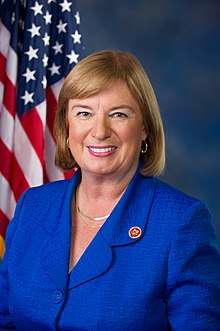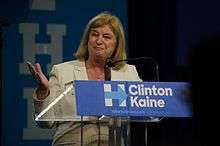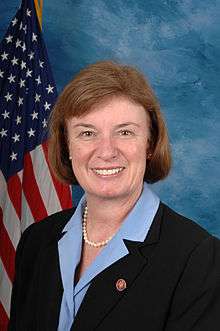Carol Shea-Porter
| Carol Shea-Porter | |
|---|---|
 | |
| Member of the U.S. House of Representatives from New Hampshire's 1st district | |
|
Assumed office January 3, 2017 | |
| Preceded by | Frank Guinta |
|
In office January 3, 2013 – January 3, 2015 | |
| Preceded by | Frank Guinta |
| Succeeded by | Frank Guinta |
|
In office January 3, 2007 – January 3, 2011 | |
| Preceded by | Jeb Bradley |
| Succeeded by | Frank Guinta |
| Personal details | |
| Born |
December 2, 1952 New York City, New York, U.S. |
| Political party | Democratic |
| Education | University of New Hampshire (BA, MPA) |
| Website | House website |
Carol Shea-Porter (born December 2, 1952) is an American politician and member of the Democratic Party who serves as the U.S. Representative for New Hampshire's 1st congressional district since January 2017. She previously held the same seat from 2007 to 2011 and from 2013 to 2015.
Shea-Porter was first elected in 2006, defeating Republican incumbent Jeb Bradley. She beat Bradley again in 2008 but was defeated in 2010 by former Manchester Mayor Frank Guinta and left Congress in January 2011.[1] In 2012, Shea-Porter reclaimed her seat as she beat Guinta in a rematch. She faced Guinta for a third time in the 2014 election and lost for the second time. On July 2, 2015, she announced she would again run for her old seat. She defeated Guinta for the second time, the fourth straight election in a row that the two faced each other.
On October 6, 2017, Shea-Porter announced that she will not run for re-election in 2018.[2]
Early life, education and career
Shea-Porter was born in New York City[3] and grew up in the Seacoast Region of New Hampshire, attending local public schools, and graduating from the University of New Hampshire.[4] She earned a bachelor's degree in social services and a master's degree in public administration.[5][6] Prior to becoming involved in politics, she and her family lived in Colorado, Louisiana, and Maryland, during which time she was a social worker and community college instructor.[7]
After returning to New Hampshire, she worked for the Wesley Clark presidential campaign and was a volunteer for John Kerry’s presidential run.[7] She is married to Gene Porter, a former U.S. Army officer, with whom she has two grown children.
Political campaigns
2006
In 2006, Shea-Porter was a liberal community activist who had never held public office. Shea-Porter, who had won some fame for being escorted from a George W. Bush rally wearing a T-shirt that read "Turn Your Back On Bush," ran on a strong anti-Iraq War message.[8][9] In addition to opposition to the Iraq war, Shea-Porter campaigned on a platform of increasing the minimum wage and universal healthcare.[10][11] In the five-way Democratic primary, the Democratic Congressional Campaign Committee put its weight behind state legislator Jim Craig. Shea-Porter won the September 12, 2006, primary with 54% of the vote. Craig finished second with 34% of the vote.[12]
On November 7, 2006, Shea-Porter narrowly defeated incumbent Republican Jeb Bradley in the 2006 midterm elections to become the first woman elected to Congress from New Hampshire. Shea-Porter received 100,899 votes (51%) to Bradley's 94,869 votes (49%). She received no financial support from either the Democratic National Committee or the Democratic Congressional Campaign Committee and was outspent by her opponent three to one.[13]
2008

Shea-Porter was re-elected to a second term in November 2008, defeating Bradley for the second time, winning by 52% to 46% margin. The Concord Monitor in 2008 changed its endorsement, which had gone to Bradley in 2006, to support Shea-Porter, citing her positions in favor of increased minimum wage, ending the Bush tax cuts, and veterans issues.[14]
During her 2008 re-election campaign, she reversed course and requested financial support from the Democratic Congressional Campaign Committee. The Committee enrolled Congresswoman Shea-Porter in their "Frontline" program "which helps vulnerable incumbents with fundraising and campaign infrastructure."[15]
2010
Shea-Porter was defeated by her Republican opponent, former Manchester Mayor Frank Guinta, who won by a 54% to 42% margin, larger than Shea-Porter has won to date.
2012
Shea-Porter launched a 2012 campaign for her old House seat in New Hampshire's 1st District. She received the endorsement of Democracy for America, and was selected as one of their Dean Dozen. In the general election she narrowly won the seat back from Frank Guinta, who had won in the 2010 election.
2014
Shea-Porter ran for re-election. She was once again a member of the Democratic Congressional Campaign Committee's Frontline Program, which is designed to help protect vulnerable Democratic incumbents heading into the 2014 election.[16] Shea-Porter made Roll Call's "Ten Most Vulnerable" list for the third quarter. According to Roll Call, New Hampshire is a swing state and could be susceptible to national political trends.[17] The Rothenberg Political Report considered the election a “Toss-up.”[18] Mayday PAC, a super PAC seeking to reduce the role of money in politics, announced its endorsement of Shea-Porter because of her support of campaign finance reform.[19] She was also being supported in her election campaign by EMILY's List, a political action committee that seeks to elect pro-choice Democratic women.[20] Shea-Porter lost to Guinta again by a margin of 52% to 48%.
2016

Shea-Porter ran again for U.S. Congress in 2016 and was elected on November 8. She ran unopposed in the Democratic primary.[21] She faced incumbent Republican Frank Guinta and independent candidate Shawn O'Connor in the general election,[22] defeating them both with 44.2% of the vote to return to Congress.[23] Shea-Porter has now lost to Guinta twice and beat him twice.
U.S. House of Representatives
Committee assignments
- Previous
- Committee on Education and Labor (2007-2011; 2017–present)
- Committee on Armed Services (2007-2011; 2013-2015; 2017-present)
- Committee on Natural Resources (2007-2011; 2013-2015)
She is a member of the Congressional Progressive Caucus,[24] the Congressional Arts Caucus,[25] and the United States Congressional International Conservation Caucus.[26]
Tenure

In 2010, Shea-Porter was a lead co-sponsor of a bill aimed to help protect troops in Iraq and Afghanistan from the disposal of toxic waste in open air burn pits.[27] Also in 2010, she co-sponsored legislation to establish a national commission to study urological war injuries.[28] After the 2012 Benghazi attack, Shea-Porter said the U.S. should continue a relationship to achieve democracy in Libya.[29]
Shea-Porter supports decreasing U.S. reliance on foreign energy sources and agrees with a number of the objectives of financier and oil magnate T. Boone Pickens on these matters including continuance of emissions trading measures, a system already in effect for her constituency in the form of the Regional Greenhouse Gas Initiative.[30] Shea-Porter opposes the Keystone XL pipeline and believes that the United States needs a policy that moves away from oil as a primary energy source.[29] She voted for the American Clean Energy and Security Act, which proposed a cap and trade system under which the government would allocate carbon permits and credits to companies.[31][32] She has advocated for the creation of a federal institute dedicated to reducing dependence on foreign oil.[33]
Shea-Porter voted for the Patient Protection and Affordable Care Act (often better known as Obamacare), saying "We’ll continue to work on that, but this is a good bill.”[29] She led an effort to pass the Affordable Care Act and stated her support for closing the "donut hole" in Medicare reimbursements for senior citizens.[34]
In June 2013, Shea-Porter voted against the Pain-Capable Unborn Child Protection Act, which would ban abortions that take place 20 or more weeks after fertilization.[35]
Shea-Porter voted against the No Budget, No Pay Act of 2013, which would have “docked pay for members of Congress if they didn’t make progress on passing a budget.”[36] She also opposed a vote to freeze federal employee pay.[36]
In August 2014 Shea-Porter voted against an immigration bill that would increase funding for border protection and more administrative support.[37]
Shea-Porter voted for the auto industry bailout[38] and the "Cash for Clunkers" bill.[39]
Town hall disruptions
Following the passage of the Patient Protection and Affordable Care Act, many members of Congress held town hall meetings throughout their districts in an effort to explain and, in some cases, defend their votes. Shea-Porter, like several of her colleagues, found herself on the defensive at two such events held in Portsmouth and Bedford. She took about a dozen questions at each, the majority of which “were in opposition to Shea-Porter's health care vote.”[40][41]
Electoral history
| Year | Office | Election | Subject | Party | Votes | % | Opponent | Party | Votes | % | Opponent | Party | Votes | % | Opponent | Party | Votes | % | ||||
|---|---|---|---|---|---|---|---|---|---|---|---|---|---|---|---|---|---|---|---|---|---|---|
| 2006 | Congress, District 1 | General | Carol Shea-Porter | Democratic | 100,837 | 51.31 | Jeb Bradley | Republican | 95,538 | 48.61 | ||||||||||||
| 2008 | Congress, District 1 | General | Carol Shea-Porter | Democratic | 176,461 | 51.78 | Jeb Bradley | Republican | 156,394 | 45.89 | Robert Kingsbury | Libertarian | 8,100 | 2.4 | ||||||||
| 2010 | Congress, District 1 | General | Carol Shea-Porter | Democratic | 95,503 | 42.36 | Frank Guinta | Republican | 121,655 | 53.96 | Philip Hodson | Libertarian | 7,966 | 3.5 | ||||||||
| 2012 | Congress, District 1 | General | Carol Shea-Porter | Democratic | 171,356 | 49.7 | Frank Guinta | Republican | 158,482 | 46.0 | Brendan Kelly | Libertarian | 14,521 | 4.2 | ||||||||
| 2014 | Congress, District 1 | General | Carol Shea-Porter | Democratic | 116,626 | 48.2 | Frank Guinta | Republican | 125,321 | 51.8 | ||||||||||||
| 2016 | Congress, District 1 | General | Carol Shea-Porter | Democratic | 162,080 | 44.3 | Frank Guinta | Republican | 157,176 | 43.0 | Shawn O'Connor | Independent | 34,735 | 9.5 | Others | 11,581 | 3.17 | |||||
See also
References
- ↑ Fahrenthold, David A. (December 9, 2010). "Between Losing and Going Home: The House Basement". The Washington Post. Retrieved December 19, 2010.
- ↑ Marcos, Cristina (October 6, 2017). "Vulnerable Democrat won't seek reelection". The Hill. Retrieved October 6, 2017.
- ↑ Sangillo, Gregg (October 5, 2012). "New Hampshire, 1st House District". National Journal. Retrieved August 6, 2014.
- ↑ "Boston.com "Carol Shea Porter's unusual journey to Congress"". Archived from the original on November 18, 2006. Retrieved November 11, 2006. (registration required)
- ↑ Carol Shea-Porter (2006). Carol Shea Porter for Congress (NH 01). New Hampshire: ListenUpNH.org. An early video "audition" introducing herself to the voters for the 2006 Congressional race which she won.
- ↑ "Carol Shea-Porter (D)". Washington Post. Retrieved August 6, 2014.
- 1 2 "Carol Shea-Porter (D)". Wall Street Journal. Retrieved August 6, 2014.
- ↑ Weigel, David (August 12, 2010). "Crazy Enough To Win". Slate. Retrieved September 11, 2014.
- ↑ "Carol Shea-Porter (D)". Election 2012. Wall Street Journal. Retrieved September 11, 2014.
- ↑ Mark, David (September 9, 2008). "Shea-Porter faces tough race in N.H." Politico. Retrieved September 11, 2014.
- ↑ Benton Cooney, Jessica (January 17, 2007). "Makeover in New Hampshire 1st District: Freshman Rep. Shea-Porter". New York Times. Retrieved September 11, 2014.
- ↑ Secretary of State Results for New Hampshire 1st Congressional District, Democratic Primary, September 12, 2006
- ↑ Winograd, Morley; Hais, Michael D. (2008). Millennial makeover: MySpace, YouTube, and the future of American politics. New Brunswick, New Jersey: Rutgers University Press. p. 126. ISBN 978-0-8135-4301-7. OCLC 156994481.
- ↑ "Shea-Porter best for the 1st" Concord Monitor editorial (October 27, 2008)
- ↑ "Shea-Porter requests DCCC help in race", Politico.com, May 21, 2008
- ↑ "DCCC CHAIRMAN STEVE ISRAEL ANNOUNCES 2013-2014 FRONTLINE MEMBERS". DCCC. March 5, 2013. Archived from the original on March 8, 2013. Retrieved August 6, 2014.
- ↑ Center, Shira (November 4, 2013). "Roll Call's 10 Most Vulnerable House Members Revealed". Roll Call. Retrieved August 6, 2014.
- ↑ "House Ratings". Rothenberg Political Report. August 15, 2014. Retrieved September 4, 2014.
- ↑ Sullivan, Sean (August 11, 2014). "A leading 'anti-super PAC' just backed three more candidates for Congress". Washington Post. Retrieved August 11, 2014.
- ↑ Jaffe, Alexandra (April 10, 2014). "EMILY's List targets female voters in NH Senate race". The Hill. Retrieved September 4, 2014.
- ↑ DiStaso, John (March 25, 2016). "Innis suspends congressional campaign, says family, business interests come first". WMUR. Retrieved March 25, 2016.
- ↑ Koziol, John (October 31, 2016). "1st Congressional candidates face off in North Conway". New Hampshire Union-Leader. Retrieved November 3, 2016.
- ↑ "New Hampshire U.S. House 1st District Results: Carol Shea-Porter Wins". The New York Times. November 15, 2016. Retrieved November 15, 2016.
- ↑ "Caucus Members". Congressional Progressive Caucus. Retrieved 25 October 2017.
- ↑ "Membership". Congressional Arts Caucus. Retrieved 23 March 2018.
- ↑ "Our Members". U.S. House of Representatives International Conservation Caucus. Retrieved 5 August 2018.
- ↑ "Shea-Porter: Bill will protect troops" (January 25, 2010) AP
- ↑ "Shea-Porter sponsors bill on urological war wounds". Seacoast Online. Associated Press. April 24, 2010. Retrieved September 11, 2014.
- 1 2 3 Berry, Jake (October 10, 2012). "Guinta, Shea-Porter voice vast policy differences in TV debate". The Telegraph.
- ↑ Shea-Porter, Carol (July 21, 2009). "Carol Shea-Porter: Cap And Trade Will Create Jobs, Improve Our Energy Future" (PDF). New Hampshire Union Leader. Archived from the original (PDF) on September 18, 2010.
- ↑ FINAL VOTE RESULTS FOR ROLL CALL 477 (American Clean Energy and Security Act) House.gov
- ↑ Quinton, Amy (October 26, 2010). "Candidates Quiet on Climate Change". NHPR. Retrieved August 6, 2014.
- ↑ Sangillo, Greg (November 5, 2012). "New Hampshire, 1st House District". National Journal. Retrieved September 11, 2014.
- ↑ "Medicare 'donut hole' checks in the mail". Fosters.com. August 12, 2010. Retrieved November 13, 2010.
- ↑ "'Pain-Capable' babies: Whither Kuster, Shea-Porter?". Union Leader. June 22, 2013. Retrieved September 4, 2014.
- 1 2 Leubsdorf, Ben (September 15, 2013). "Capital Beat: Kuster and Shea-Porter stick together in the U.S. House, except when they don't". Concord Monitor. Retrieved September 4, 2014.
- ↑ "Congressional hopefuls divided on immigration". Eagle Tribune. August 26, 2014. Retrieved September 4, 2014.
- ↑ Palermo, Sarah (October 28, 2012). "First District candidate Carol Shea-Porter outlines congressional agenda". Concord Monitor. Retrieved August 6, 2014.
- ↑ Sletten, Phil (June 13, 2009). "Cash for Clunkers Fails to Earn Gregg's Support". NHPR. Retrieved August 6, 2014.
- ↑ "Tempers hot at Shea-Porter health meetings" Union Leader (August 30, 2010) Archived February 9, 2010, at the Wayback Machine.
- ↑ "Protesters Question Shea-Porter On Health Care Law: Tea Party Members Plan Protests At Town Hall Meetings" WMUR (March 31, 2010)
External links
| Wikimedia Commons has media related to Carol Shea-Porter. |
- Congresswoman Carol Shea-Porter official US House website
- Campaign website
- Carol Shea-Porter at Curlie (based on DMOZ)
- Biography at the Biographical Directory of the United States Congress
- Profile at Vote Smart
- Financial information (federal office) at the Federal Election Commission
- Legislation sponsored at the Library of Congress
| U.S. House of Representatives | ||
|---|---|---|
| Preceded by Jeb Bradley |
Member of the U.S. House of Representatives from New Hampshire's 1st congressional district 2007–2011 |
Succeeded by Frank Guinta |
| Preceded by Frank Guinta |
Member of the U.S. House of Representatives from New Hampshire's 1st congressional district 2013–2015 |
Succeeded by Frank Guinta |
| Preceded by Frank Guinta |
Member of the U.S. House of Representatives from New Hampshire's 1st congressional district 2017–present |
Incumbent |
| Current U.S. order of precedence (ceremonial) | ||
| Preceded by Colleen Hanabusa |
United States Representatives by seniority 246th |
Succeeded by Andy Barr |
New Hampshire's delegation(s) to the 110th–111th, 113th & 115th United States Congresses (ordered by seniority) | ||
|---|---|---|
| 110th | Senate: J. Gregg | J. Sununu | House: P. Hodes | C. Shea-Porter |
| 111th | Senate: J. Gregg | J. Shaheen | House: P. Hodes | C. Shea-Porter
|
| 113th | Senate: J. Shaheen | K. Ayotte | House: C. Shea-Porter | A. Kuster
|
| 115th | Senate: J. Shaheen | M. Hassan | House: C. Shea-Porter | A. Kuster |